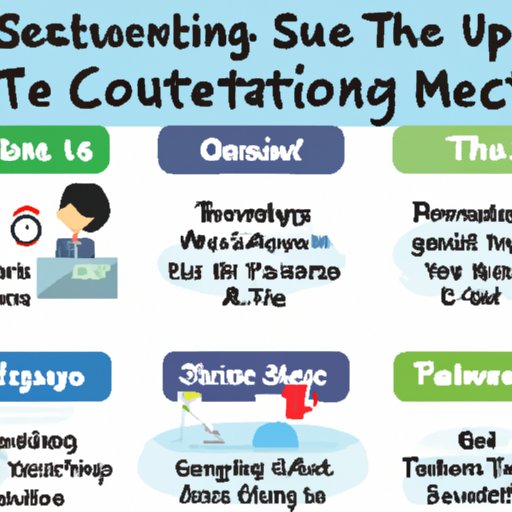Introduction
For many employees, taking vacation time can be a great way to relax and recharge. But what if you don’t have enough vacation time saved up? Can you use your sick days for a vacation instead? The answer to this question depends on a variety of factors, including your employer’s policies and your own personal situation. In this article, we’ll explore the pros and cons of using sick days for vacation and provide strategies for managing your sick days and vacation time responsibly.

Definition of Sick Days and Vacation Time
First, let’s define what we mean by “sick days” and “vacation time.” According to the United States Department of Labor, sick leave is “time away from work that an employee is entitled to take due to illness or injury” (1). It’s usually offered as part of an employee benefits package and is paid or unpaid depending on the employer. Vacation time, on the other hand, is “time away from work that an employee is entitled to take for leisure or personal reasons” (2). Some employers offer paid vacation time, while others offer unpaid vacation time.

Overview of the Pros and Cons of Using Sick Days for Vacation
On the surface, it might seem like a good idea to use your sick days for a vacation. After all, you still get to take time off work and enjoy some rest and relaxation. However, there are also several potential drawbacks to using sick days for vacation. For one thing, it could potentially lead to disciplinary action from your employer if they find out. Additionally, it could impact your reputation with coworkers and supervisors if they know you’re not actually sick. Finally, it could also lead to a decrease in morale among your coworkers if they believe you’re abusing the system.
How Companies Handle Employees Who Take Vacations Using Sick Days
Employers typically have specific policies in place regarding how employees can use their sick days. These policies vary from company to company, but they typically include rules such as requiring employees to provide a doctor’s note if they’re going to be out for more than a certain number of days and prohibiting employees from taking sick days for vacation. Employers may also require employees to submit requests for vacation days in advance, which may be difficult if you’re trying to use your sick days for vacation.
If an employer finds out that an employee has taken a vacation using sick days, they may take disciplinary action. This could include anything from a warning to suspension or even termination, depending on the severity of the offense. It’s important to check with your employer to make sure you understand their policies regarding sick days and vacation time.
Is It Ever Acceptable to Use Sick Days for Vacation?
In some cases, it may be acceptable to use your sick days for vacation. For example, if you’ve already used up all of your vacation time and you have a serious medical issue that requires time off work, it may be acceptable to use your sick days for a vacation. Additionally, if your employer allows it, you may be able to use your sick days for vacation in order to take care of a family member who is ill or injured.
However, it’s important to remember that these situations are rare, and it’s best to check with your employer before taking any action. Additionally, it’s important to consider the potential consequences of taking a vacation using sick days. Even if your employer is understanding, it could still cause tension within the workplace, as well as damage your reputation with your coworkers and supervisors.
Factors to Consider Before Taking a Vacation Using Sick Days
If you’re considering using your sick days for vacation, there are several important factors to consider. First, think about whether you really need the time off. Is the vacation urgent, or could it wait until you’ve saved up more vacation time? If the vacation isn’t urgent, it may be better to save your sick days for when you’re actually sick.
Additionally, consider the potential consequences of taking a vacation using sick days. Will your employer be understanding, or will they take disciplinary action? Are your coworkers likely to be supportive, or will they resent you for taking advantage of the system? Answering these questions can help you decide whether taking a vacation using sick days is the right decision for you.

Strategies for Managing Your Sick Days and Vacation Time
To avoid overusing your sick days and vacation time, it’s important to develop a system for tracking your days off. This could include keeping a calendar that shows when you’ve taken sick days and vacation days, or setting reminders in your phone or computer to remind you when you’re approaching the limit for either type of day off.
It’s also important to plan ahead when it comes to taking time off. Try to schedule vacations and other activities well in advance so that you don’t have to rely on your sick days. Additionally, try to take sick days only when absolutely necessary—if you’re feeling under the weather, it’s better to stay home and rest than to try to push through and risk getting worse.
An Overview of Employee Rights Regarding Taking Vacation Time and Sick Days
It’s important for employees to understand their rights when it comes to taking vacation time and sick days. Federal law does not mandate that employers provide either paid or unpaid vacation time or sick leave, although some states do have laws that require employers to provide paid or unpaid sick leave. It’s important to check with your employer to make sure you understand their policies regarding vacation time and sick days.
Additionally, it’s important to understand your rights as an employee. Under federal law, employers cannot discriminate against employees who take vacation time or sick days. They also cannot retaliate against employees who take lawful time off. If you feel that your employer is not following the law, you can file a complaint with the Equal Employment Opportunity Commission (EEOC).
Conclusion
Using sick days for vacation can seem like a convenient solution, but it’s important to consider the potential consequences before doing so. Depending on your employer’s policies, you may face disciplinary action or damage to your reputation if you take a vacation using sick days. Additionally, it’s important to understand your rights as an employee when it comes to taking vacation time and sick days. To ensure that you’re making wise decisions about your sick days and vacation time, it’s best to create a system for tracking your days off and plan ahead for vacations and other activities.
(Note: Is this article not meeting your expectations? Do you have knowledge or insights to share? Unlock new opportunities and expand your reach by joining our authors team. Click Registration to join us and share your expertise with our readers.)
